Photographs: Punit Paranjpe/Reuters Surajeet Das Gupta, Aneesh Phadnis and Mihir Mishra in New Delhi
Air India's pilots have been hurting customers with their repeated strikes.
But the root of the problem is the badly managed merger of Air India and Indian Airlines.
They preferred to check in to the Hilton whenever they flew to New York, Chicago or Mumbai, rather than a less expensive hotel.
It did not matter that the bill had to be paid by loss-making Air India.
Pilots on flights to Jeddah did not think twice before spending well above their limit -- hotels, foreign allowance, transportation, even visa fees.
When civil aviation minister Ajit Singh informed Parliament a few days ago about alleged irregularities by highly paid pilots, the news did not take anyone by surprise.
. . .
AI's woes: What's plaguing the Maharajah
Photographs: Reuters
After all, pilots have never had passenger empathy.
Their swanky lifestyle, bulging pay packets and habit of holding their airline to ransom have seen to that.
But Singh's statement struck a chord among the AI passengers who had had to change their international travel plans because AI's pilots decided to go on mass sick leave.
For the last two weeks, over 450 Air India pilots under the Indian Pilots Guild have refused to fly on medical grounds.
This is threatening the future of the airline, which has just got a government cash infusion.
Confronted with the sudden pilot action, the AI management had to act quickly to cut international flights and set up a contingency plan to last till June 30.
. . .
AI's woes: What's plaguing the Maharajah
Photographs: Reuters
Thousands of travellers' summer travel plans are disrupted.
AI is losing Rs 15-20 crore (Rs 150-200 million) a day.
It is losing passenger confidence.
But the pilots are unapologetic.
Despite an order by the Delhi high court to the pilots to join duty immediately, the IPG pilots are still holding on.
Says IPG office-bearer Tauseef Mukhadam, "We are what we are because of Air India. But we cannot compromise on our career progression."
So in a cutthroat market, while private airlines fight for passengers, AI pilots who fly international routes are warring with pilots of the erstwhile Indian Airlines over seniority and the future.
. . .
AI's woes: What's plaguing the Maharajah
The IPG pilots' ire is directed against their IA colleagues.
The IPG pilots want a career progression to match those of IA pilots.
They say it takes an AI pilot 10 years to become commander, and even that has to wait until there is a vacancy.
But IA pilots receive time-bound promotion to commander within six years, even if more commanders are not required.
Second, IPG pilots do not want IA pilots to step on their turf -- the international routes.
They fear this because the IA pilots, too, will be trained to fly the new Boeing 787-8 Dreamliners.
The Dreamliners, the first of which joins the fleet in a few weeks, will fly medium- and long-haul international routes.
. . .
AI's woes: What's plaguing the Maharajah
Photographs: Vivek Prakash/Reuters
But the timing of IPG's strike could not have been worse.
AI's Rs 30,000 crore-plus (Rs 300-billion) restructuring, cleared by the Cabinet, is pegged on performance parameters like load factor and growth, which will now go awry.
Also, in the peak summer months
AI flies over 14,000 passengers abroad every day, which is 35 per cent of all passengers it carries.
Look at it another way: AI has over 20 per cent of the international market to and from India -- a share which suddenly has to be filled by others.
As a result, fares on international routes have shot up 20 per cent.
. . .
AI's woes: What's plaguing the Maharajah
Photographs: Reuters
If Ajit Singh is to be believed, the airline has lost Rs 250 crore in revenue, as well as reputation.
"The losses that we have been able to calculate are only in terms of revenue," he says. "This agitation will have a long-term impact on revenues, and that will show."
So, Singh and his men are being tough.
They have sacked a fifth of the IPG pilots (101 of 450), derecognised the union and then did not call it to a recent meeting with recognised unions on the Justice Dharmadhikari Report -- which suggested ways of integrating staff of the two former airlines.
Singh has said that he will not talk to the IPG pilots until they withdraw the agitation.
But he is willing to take sacked pilots back if they return to work.
. . .
AI's woes: What's plaguing the Maharajah
Photographs: Reuters
Singh warns of more tough decisions: "A lot needs to be done in rationalising routes and salaries.
"We expect a lot of trouble when we implement that."
Many analysts, however, say that Singh has pushed through route rationalisation during the agitation by reducing flights abroad and closing loss-making routes.
By reducing flights, they say, he cuts losses because international routes make 80 per cent of AI's losses.
Others disagree and say that no airline can afford to let its aircraft lie idle, and that it undermines the brand.
But why has the Maharajah fallen in esteem?
. . .
AI's woes: What's plaguing the Maharajah
Image: A fuel tanker moves past Air India passenger jets parked at an airport in Kolkata.Photographs: Rupak De Chowdhuri/Reuters
The answer lies in the growing wedge between the two aggressive pilots' unions which have time and again played havoc on the airline since the AI-IA merger.
The management has ignored the challenges of integration and repeatedly conceded the unions' demands against each other.
The latest battle is over who will fly the Dreamliner.
AI will soon get the first of 27. Before the merger it would have been obvious which pilots would fly the new aircraft: AI pilots, who have experience in Boeings. IA flew only Airbus.
But the merger threw up a new issue: cross-utilisation of pilots.
. . .
AI's woes: What's plaguing the Maharajah
The IPG pilots say this issue was to be resolved by the Justice Dharmadhikari Report, but that AI pushed through a policy in October 2011 under which equal numbers of pilots of the formerly separate airlines would train for the Dreamliner.
IPG objected, went to court, and lost.
The IPG's opposition is understandable: with eight pairs of pilots required for each Dreamliner, as many as 432 pilots will have to be trained once all the planes are delivered.
This would bring most of the erstwhile AI pilots their long-awaited promotions. In fact, AI had hired pilots to handle the increase in the international fleet size from 23 to around 50 after induction of the new planes.
. . .
AI's woes: What's plaguing the Maharajah
Photographs: Scott Barbour/Getty Images
So the decision that half the Dreamliner pilots would come from IA was a rude shock.
In the first stage, the management sent 16 IA pilots to train.
These slots the IPG pilots claimed as their own.
An IPG-affiliated pilot says: "With IA pilots now being allowed to fly Dreamliners we will become commanders only after 24 years.
"This means that a pilot who has joined the erstwhile Indian Airlines even four years after a pilot in the former AI will be commander of a 787 even if they operate together, while the AI pilot will report under him."
. . .
AI's woes: What's plaguing the Maharajah
Photographs: Reuters
IPG pilots say this is unfair.
They are not allowed to break onto the IA pilots' turf.
They demand that as many commander slots as are opened on Dreamliners for IA pilots should be opened for them on the Airbus A-320 aircraft currently flown only by IA pilots.
But this has not been conceded.
Second, they want pilot progression on both sides to be based on seniority.
This condition was rejected by the Indian Commercial Pilots Association, which represents the IA pilots.
. . .
AI's woes: What's plaguing the Maharajah
Photographs: Jewella C Miranda/Rediff Archives
Instead, ICPA wants it to be done on the basis of experience and staff requirements, not seniority, which ICPA says is the global norm.
ICPA members argue that they are as qualified to fly big planes like the Dreamliner internationally as are their AI colleagues.
Last year, they say, the management agreed to reduce the number of expatriate pilots (around 100) flying abroad, and those slots were to be filled by ICPA pilots, without impacting the IPG pilots.

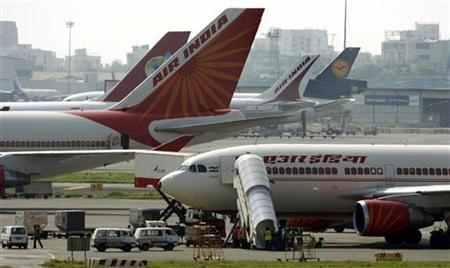
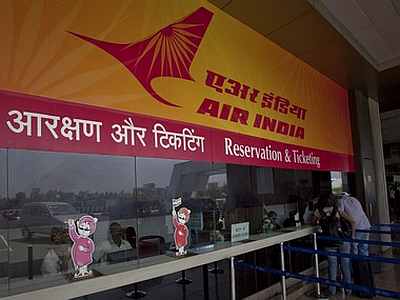
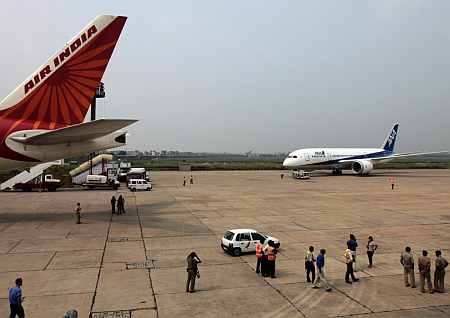
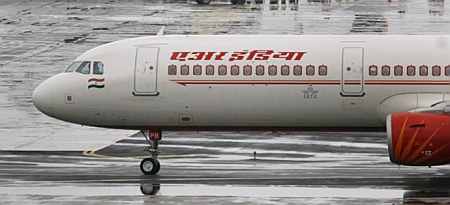
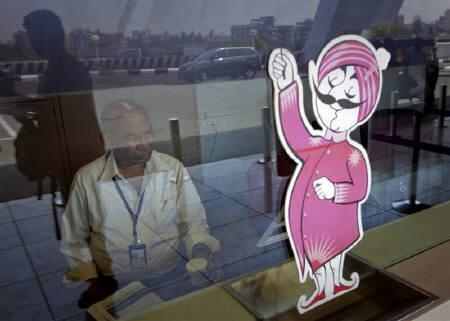
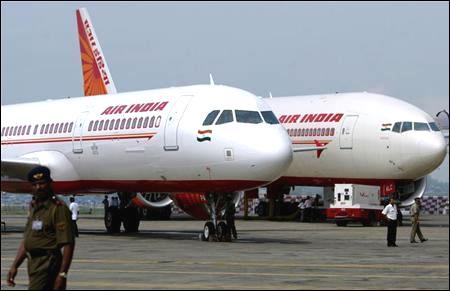
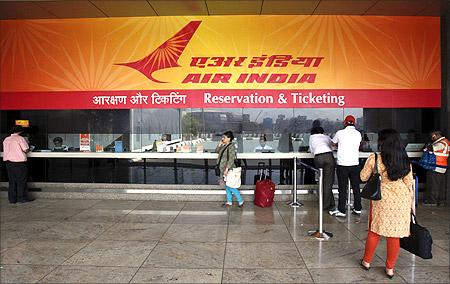
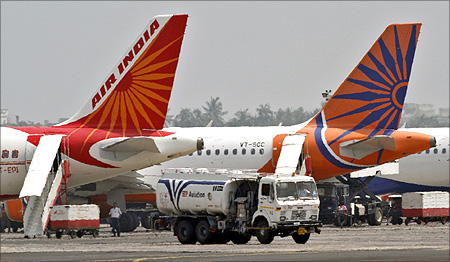


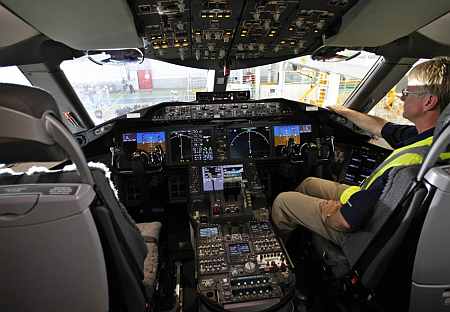


article